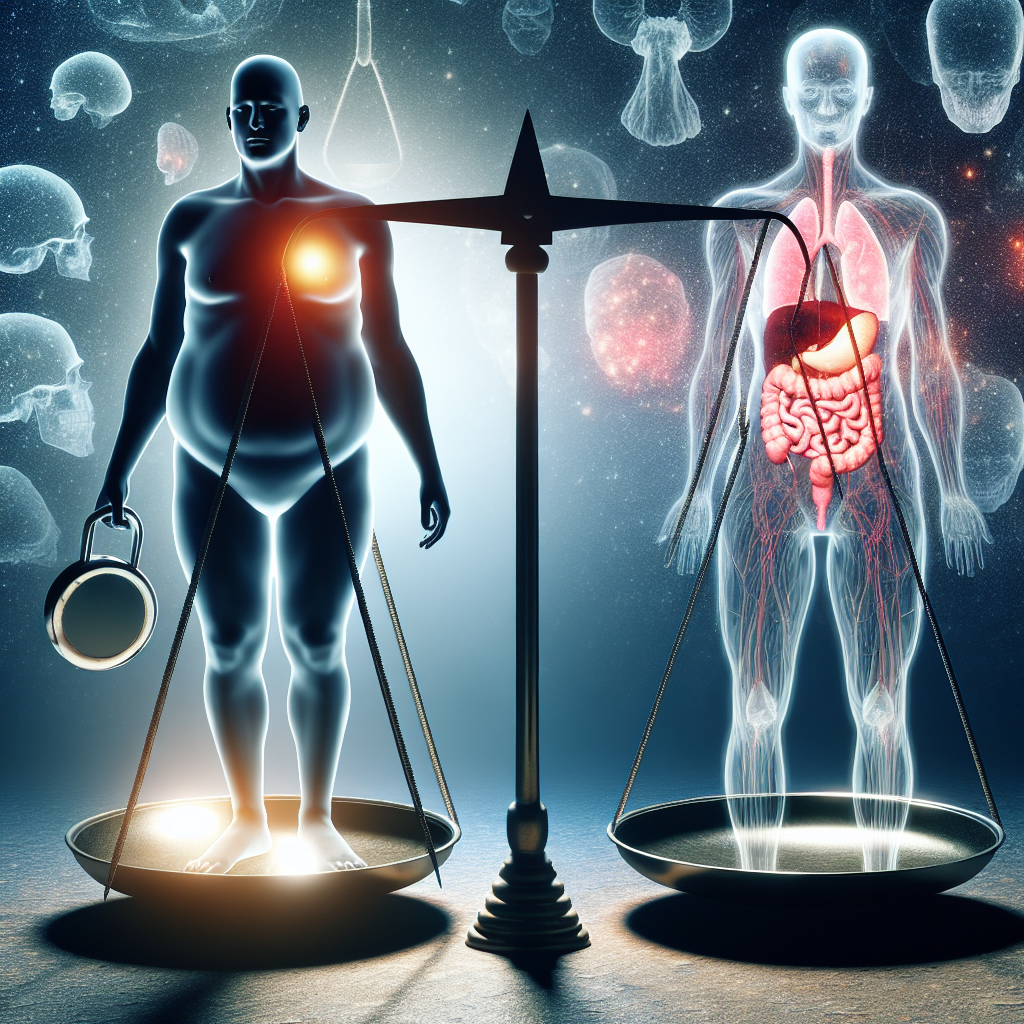Obesity-related Cancer
In this narrative of our struggle, we embark on a journey exploring the intricate connections between obesity and cancer. Under the lens of expert research and scientific insights, our story unfolds, tracing the web of links and consequences that bind this troubling duality. Unseen to the naked eye, these ties pull at the strings of health, unraveling wellbeing, and precipitating an array of obesity-related cancer types. Together, we shed light on this dark issue, exploring the mysteries and methods behind this most pressing of modern health crises.

Understanding Obesity
Let us embark on a journey of understanding obesity, an increasingly common health malady in today’s fast-paced world. Before we delve into the complex territory of this chronic condition, let’s lay the groundwork.
Definition of Obesity
Obesity is a medical condition characterized by an excess amount of body fat. It’s not simply about body weight or cosmetic concerns; this is a burgeoning health issue that can gravely impact the quality of life and longevity.
Causes of Obesity
Several intricate factors contribute to obesity, including genetics, behavior, metabolism, and the environment. Often, it is a result of an energy imbalance—when we consume more calories than we burn—and leads to a long-term accumulation of fat reserves.
Prevalence of Obesity Globally
Looking across the globe, we see obesity asserting its intrusive foothold with alarming frequency. According to the World Health Organization, there were over 650 million adults suffering from obesity in 2016. No longer a high-income country problem, obesity is on the rise in low and middle-income countries, particularly in urban settings.
Risks Associated With Obesity
Our concern with obesity extends beyond its prevalence—it’s the health risks associated with it that demand our attention. These include heart diseases, type 2 diabetes, stroke, and certain types of cancers—collectively, the leading causes of preventable deaths.
Introduction to Obesity-related Cancer
Let’s now navigate towards obesity-related cancer, a disquieting offshoot of obesity which needs illumination.
Defining Obesity-related Cancer
Obesity-related cancer refers to a subset of cancers where risk increases with a gain in body weight. These cancers are borne out of the interplay between excess body fat and cellular processes, leading to abnormal cell growth and potential malignancies.
The connection between Obesity and Cancer Risk
Our evolving understanding of obesity and its influence on cancer risk illuminates a somber landscape—obesity is linked with an increased risk of many major cancers. This alarming link between excess weight and cancer risk underscores the urgency of addressing obesity as a crucial public health issue.
Statistics on Obesity-related Cancer
Here’s a sobering statistic: Overweight and obesity are associated with at least 13 types of cancer which together constitute 40% of all cancers diagnosed. In the United States, it is estimated that 55% of all cancers diagnosed in women and 24% of those in men are related to overweight and obesity.
Types of Obesity-related Cancer
Each type of obesity-related cancer is unique, with distinct characteristics and risk factors.
Breast Cancer
One of the most common types among women, obesity, especially postmenopausal obesity, has been identified as a significant risk factor for breast cancer.
Colorectal Cancer
Colorectal cancer, impacting both men and women, is also associated with obesity. The increased risk may be due to a diet high in fat and low in fiber, typical in obesity.
Prostate Cancer
For men, prostate cancer is a leading concern. While obesity’s impact on the overall risk of prostate cancer remains unclear, evidences indicate a higher risk of aggressive prostate cancer in men with obesity.
Endometrial Cancer
Obesity notably increases the risk of endometrial cancer, possibly due to higher levels of estrogen produced by excess fat tissue.
Kidney Cancer
Obesity is considered a major risk factor for kidney cancer, with the likelihood increasing parallel to weight gain.
Esophagus Cancer
Obesity, particularly abdominal obesity, is linked with esophagus cancer, attributed potentially to gastroesophageal reflux disease and resultant chronic inflammation.
Obesity and Cancer Risk: Biological Mechanisms
Exploring the biological mechanisms underlying the link between obesity and cancer risk reveals a Pandora’s box of pathological processes.
Adipose tissue inflammation and Cancer
Adipose tissue inflammation in obesity could fuel cancer development by creating a pro-inflammatory, pro-growth environment suitable for cancer cells.
Insulin Resistance, Obesity, and Cancer
Insulin resistance, a common manifestation of obesity, can promote cancer development and progression. High insulin levels can stimulate cell proliferation and inhibit apoptosis, potentially leading to cancer.
Role of Hormones in Obesity related Cancer
Obese individuals often have altered levels of hormones such as insulin, leptin, and estrogen, which can act as growth factors facilitating tumor development and progression.
Impact of Excess Weight on DNA
Emerging research suggests that obesity can cause genetic and epigenetic changes, thereby increasing cancer susceptibility.

Factors Contributing to Obesity-related Cancer
The landscape of factors contributing to obesity-related cancer is complex, much like the disease itself.
Lifestyle Factors
dietary habits, sedentary lifestyle, and tobacco and alcohol use are among the primary lifestyle factors contributing to obesity and, consequently, the risk of cancer.
Genetic Factors
Our genes can predispose us to obesity and influence how our bodies store fat, thereby impacting the risk of obesity-related cancers.
Environmental Factors
Factors such as socioeconomic status, cultural practices, and availability of healthy food options can also affect obesity and the resulting cancer risk.
Impact of Obesity on Cancer Prognosis
The gravitas of obesity extends to cancer prognosis, where it can cast a rather grim light.
Obesity’s Effect on Cancer Treatment Response
Obesity often complicates the effectiveness of chemotherapy, radiotherapy, and surgical intervention, thereby impacting the overall treatment outcome.
Impact on Survival Rates
A higher Body Mass Index (BMI) at cancer diagnosis often spells negative implications for survival rates, with an increased risk of cancer recurrence and lower overall survival.
Effect on Recurrence of Cancer
Higher BMI is also linked with higher cancer recurrence rates—a harbinger for a less favorable long-term prognosis.

Prevention of Obesity-related Cancer
Prevention, as they say, is better than cure. It’s particularly salient in the case of obesity-related cancer.
Importance of Maintaining Healthy Weight
Maintaining a healthy weight is a cardinal step in preventing obesity-related cancers, helping to rule out obesity’s detrimental metabolic and hormonal effects.
Role of Diet and Exercise in Prevention
A balanced diet rich in fruits, vegetables, lean proteins, healthy fats, and regular exercise collectively form the sturdy foundation of obesity and cancer prevention.
Early Detection and Regular Screening
Routine screenings facilitate early detection of both obesity and cancer, which is crucial in preventing the progression and improving prognosis.
Treating Obesity to Reduce Cancer Risk
Addressing obesity itself is a cornerstone in reducing the overall cancer risk.
Weight Loss Surgery and Cancer Risk
Studies suggest that bariatric surgeries can significantly decrease cancer risk, particularly in women, by tackling obesity at its roots.
Lifestyle Modifications
Incorporating a healthy diet, regular exercise, and stress management into our lifestyle can have a tremendous impact on managing obesity and cancer risk.
Role of Medication in Obesity Management and Cancer Prevention
Certain medications can assist with weight loss when combined with lifestyle modifications, potentially reducing the risk of obesity-related cancers.

Current Research on Obesity and Cancer
Science is ceaselessly striving to untangle the realm of obesity-related cancer.
Recent Studies of Interest
Recent investigations exploring the genetic underpinnings of obesity, the role of gut microbiota, metabolic changes, and the impact of diet and physical activity on obesity and cancer risk are expanding our understanding.
Research Gaps and Future Directions
Renewed research thrusts into understanding better the biology of obesity, identifying potential therapeutic targets, and developing effective preventive strategies are paving the way for future advances.
Conclusion: The Importance of Addressing Obesity
Our foray into the world of obesity and cancer underscores the imperative need to address obesity.
Addressing the Obesity Epidemic Globally
Tackling obesity is not just an individual concern—it requires a concerted global effort involving policy changes, public health initiatives, and community engagement.
Increased Awareness and Education Needed
Increasing public awareness about the links between obesity and cancer and promoting education about healthy lifestyle habits can make a remarkable difference.
Policy Changes to Promote Healthy Lifestyle
Government policies that promote physical activity, healthy eating, and support weight management can be instrumental in bending the obesity trend.
Our journey doesn’t end here. As each day passes, we grow more knowledgeable about obesity and its connections to cancer. Yet, the path to reducing the global burden of these debilitating conditions remains long and winding. Together, let’s strive for a future where obesity doesn’t darken our health horizons.



Pingback: Obesity-related Cancer